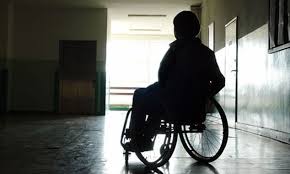Women with disabilities and 16 Days Campaign
We have just entered the 16 Days of Activism for No Violence Against Women and Children campaign here in South Africa, and disturbing to note is the absence of any mention of women and children with disabilities, both as victims and survivors of abuse which leads to disability.
This campaign is held every year for the 15 days from 26 November to 10 December, in an effort to focus public attention on the increasing violence against women and children in South Africa. My question is : Why is there little to no mention of women & children with disabilities in the public campaign?

The fact is that women with disabilities are 1.5 to 10 times more likely to suffer domestic abuse and rape, and when such cases are reported, the justice system, police services and care workers are not equipped to deal with them. They are also less likely to have access to social, reproductive and psychological counselling as so-called able-bodied women on the mistaken reasoning that they are somehow asexual or that nobody would want a physical relationship with them anyway. Many women & girls with disabilities are forced to undergo sterilisation without their consent.
Many misperceptions exist around the sexuality of women with disabilities, with some attackers going as far as not considering women & girls with disabilities as human beings, and committing the most atrocious acts because of that belief!
Initiatives which promote the prevention of violence against women and girls rarely include or reach out to women with disabilities, in particular those with mental or intellectual disabilities. There are no statistics for the actual incidence of rape cases, reported or otherwise, amongst women with disabilities. This could be because the credibility of women with disabilities is somehow questioned or simply because statistics around disability have not been differentiated into gender.
Furthermore, it is disturbing to note that there is no material on gender-based violence available in Braille, on audiotape or in large font format, nor are there dedicated shelters for women with disabilities and most existing shelters are not accessible to women with disabilities.
So what do we say to each other during this year’s 16 Days campaign? Spare a thought for women who do not enjoy the same fundamental freedoms that we do. Civil society definitely has a role to play in including women with disabilities when planning services, treatment programs and prevention campaigns. And let’s not forget Government who must provide all services available to the general public also to women with disabilities, on an equal basis and to include women with disabilities in the decision-making process.
A large part of this inclusion is accessibility; suitable transport to and from services, supported communication for women with hearing loss or speech difficulties, adequately trained and sensitised health care workers, easy to understand literature and information, as well as campaigns aimed at raising awareness of the discrepancies in attitude towards women with disabilities and promoting their rights, to name a few.
Luckily we have the White Paper on the Rights of Persons with Disabilities to guide us in this, but it is up to us to ensure that the White Paper is enforced.
Where do you stand on this issue? And are you prepared to get involved in helping to change the life of a fellow woman, a sister?
- Stop Gender Violence helpline: 0800 150 150
- Report neglect or abuse of a child: 0861 4 CHILD (24453)
- SAPS: 08600 10111
- Childline: 08000 55 555
- Report any abuse of children and women to the Department of Social Development on 0800 220 250.
- LifeLine 24-hour crisis helpline: 021 461 1111
- Rape Crisis Cape Town Trust counselling lines:
- Observatory: 021 447 9762
- Athlone: 021 633 9229
- Khayelitsha: 021 361 9085


